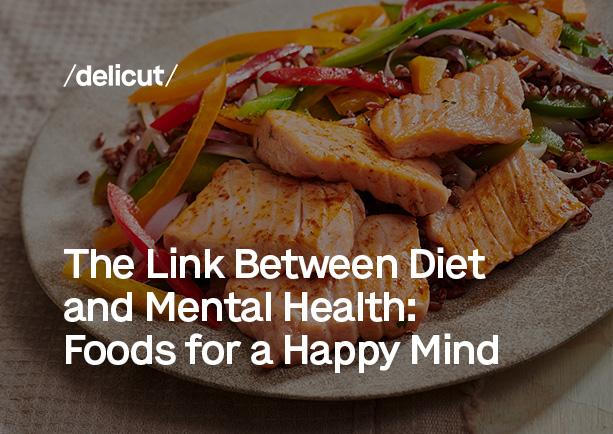The Link Between Diet and Mental Health: Foods for a Happy Mind

In a world that often moves at a relentless pace, where stress can creep in through the cracks of our daily routines, the importance of maintaining good mental health has never been more critical. While therapies and self-care practices are invaluable, there's one vital aspect of our lives that often gets overlooked in the quest for a happier mind: our diet.
Yes, what we eat plays a profound role in shaping our mental well-being. The food we consume isn't just fuel for our bodies; it's nourishment for our minds and souls. Join us on a journey into the fascinating realm of nutritional psychiatry, where we'll explore the intricate connection between diet and mental health.
The Science Behind Food and Mood
The close association between your brain and gastrointestinal tract, often known as the "second brain," creates the link between diet and emotions. In the world of flavors, food makes me happy beyond measure. Here's how it functions: Billions of bacteria influence the production of chemical substances that continuously convey messages from the gut to the brain. Two common examples of these substances are dopamine and serotonin.
Eating nutritionally dense food fosters the growth of "good" bacteria, positively impacting the production of these chemicals. When the show is at its best, your brain effectively receives these positive messages, and your mental state can reflect this positivity. Conversely, a disruption in production can negatively affect your mood.
Notably, researchers consider sugar a significant contributor to inflammation because it nurtures "bad" bacteria. Ironically, it can also lead to a temporary increase in "feel good" chemicals like dopamine. However, these spikes result in a brief sugar rush followed by a sharp crash, which is undesirable.
Adhering to a diet rich in nutrients positions you to experience fewer mood swings and improved focus. Research has indicated that clean diets, primarily composed of whole, unprocessed foods, can even alleviate symptoms of depression and anxiety. On the other hand, unhealthy diets have shown a link to a higher risk of dementia and stroke.
Foods That Help You Be Healthy and Happy
Are you curious what items to include in your cart and put on your plate? Here's a brief overview of what to look for the next time you go to the grocery store.
Whole Foods
Colorful produce contains powerful nutrients that benefit the mind and body. The vibrant colors of the foods often link to these nutritional properties. When we incorporate naturally bright items into our diet, these foods make it significantly easier for our bodies to obtain a diverse range of vitamins and nutrients, leading to various physical and psychological benefits.
Fibre
Fiber-rich plant-based foods aid in slowing down the absorption of glucose (food sugars) in your body. This helps prevent sugar rushes and crashes. Such foods include fruits, vegetables, and nutrient-filled carbs like whole grains and beans.
Antioxidants
You can find these inflammation fighters abundantly in berries, leafy green vegetables, spice turmeric, and omega-3 fatty acid-rich foods like salmon and black chia seeds. However, dark chocolate contains antioxidants and sugar, so moderation is best.
Folate
This specific B vitamin aids in dopamine production without causing sudden surges like sugars do. You can find it in leafy greens, lentils, and cantaloupes.
Vitamin D
Vitamin D is vital in serotonin production, primarily obtained through exposure to sunlight. However, mushrooms are another excellent source of this vitamin. If you are deficient in vitamin D, your doctor may suggest taking supplements.
Magnesium
This crucial mineral supports nerve and muscle function and maintains a steady heartbeat. Further, it plays a vital role in connecting food and mood. A deficiency in this mineral negatively impacts the gut bacteria, leading to symptoms similar to depression and anxiety. To ensure an adequate intake, consume natural sources such as cacao nibs, almonds, cashews, spinach, other dark leafy greens, bananas, and beans. Eating bananas releases happy hormones, a delightful mood boost!
Fermented Foods
Probiotics, beneficial live bacteria for your digestive tract, are present in fermented foods. Such foods include sauerkraut, kimchi, miso, tempeh, and the fermented drink kombucha. However, remember that these foods also tend to be high in sodium; therefore, if you have high blood pressure, consume fermented foods in moderation or avoid them altogether.
Put It On Your Plate and Get On With Your Life
With simple strategies, you can improve your eating habits, boost your mood, and enhance your overall well-being. Let's explore practical tips to incorporate mood-boosting foods into your diet without adding extra stress to your plate. From meal prep to mindful eating, these steps will help you enjoy the benefits of a healthier diet while keeping life's pace.
Prepare Ahead for Success
At first, incorporating mood-boosting foods into your diet may require extra effort. Preparing a week's worth of chopped veggies and pre-soaking and cooking beans is recommended. This makes DIY meals easier to whip up and just as enticing as take-out options. If time is limited, consider using frozen fruits and vegetables and 10-minute brown rice, quinoa, or whole-grain couscous.
Make Simple Swaps
Try making small healthy food swaps, such as choosing whole-grain versions of rice, pasta, and bread instead of white ones. This increases the intake of good fiber in your body, which aids digestion. Moreover, instead of a bag of chips, opt for a side salad filled with nuts, seeds, and colorful vegetables to add flavor to your meal.
Stick to the Basics
General nutrition rules remain essential. Stay hydrated, avoid skipping meals, and be mindful of caffeine and alcohol consumption. It is wise to consult your doctor to determine whether caffeine or alcohol is suitable based on your health history and goals. Discuss how frequently you consume them to maintain your health if deemed appropriate.
Gradual Changes for Success
There's no need to feel pressured to make all these changes simultaneously. Taking things one day at a time or introducing a new substitution each week might be more manageable. For instance, you could replace processed sugar with fresh fruit in one week, and the following week, you could incorporate more vegetables and lean protein.
Mindful Eating
Practicing presence and mindfulness during meals is another powerful tool to combat cravings or overeating. Pay attention to your food's aroma, taste, and texture as you eat. Take note of how nutritious snacks and meals make you feel afterward. For instance, some individuals who adopt a plant-based diet often experience sustained energy and improved focus throughout the day.
Be Patient for Results
Feeling the mood-boosting effects of a better diet may take days or weeks, depending on the number of changes you make. Lasting transformation doesn't occur overnight, but the healthy choices you make each day will gradually accumulate. Over time, you'll witness positive results in your mind and body. Indulge in dark chocolate for a dose of happy hormones from food.
Conclusion
As we conclude our exploration of the profound connection between diet and mental health, one thing becomes abundantly clear: the foods we choose to nourish our bodies have a significant impact on our state of mind. By embracing a balanced diet filled with mood-boosting nutrients and practicing mindful eating, we empower ourselves to live happier, more vibrant lives.
Remember, it's not just about eating for your body; it's about feeding your mind with the positivity and vitality it deserves. So, let's raise a fork to the journey of good food and a joyful mind. Bon appétit, and here's to a life filled with health, happiness, and delicious bites!
FAQs
1. What is the link between food and mental health?
Food has a substantial impact on mental health. Nutrition can directly impact emotional well-being and affect depression, anxiety, and cognitive function.
2. How does diet affect happiness?
Diet influences the production of neurotransmitters and hormones in the brain, such as serotonin and dopamine, which directly affect happiness. Consuming nutrient-rich foods and a balanced diet may improve mood and overall well-being. On the other hand, unhealthy eating habits, such as drinking excessive amounts of sugary and processed foods, can adversely impact mood and happiness.
3. What foods make you mentally happy?
Foods that promote mental happiness differ among individuals due to personal preferences and reactions to certain foods. Nonetheless, some common foods known to boost mood and provide a sense of satisfaction include:
- Dark chocolate
- Fruits and vegetables
- Nuts and seeds
- Whole grains
- Herbal teas
- Foods rich in tryptophan
Individual responses to foods vary, so listening to your body and finding what personally makes you mentally happy and content is essential.
4. How and why does our diet affect brain functioning and mental health?
Our diet affects brain functioning and mental health because our nutrients support cognitive function, neurotransmitter production, and overall brain health. Nutrition provides the necessary building blocks for neurotransmitters regulating mood and cognition. A balanced diet with essential nutrients supports brain function, while deficiencies in certain nutrients can lead to cognitive impairments and mental health issues. Additionally, the gut-brain axis highlights the link between our gut health and mental well-being, with a healthy diet positively influencing both.
5. Is a good diet good for mental health?
Yes, a good diet is beneficial for mental health. Proper nutrition supports brain function, mood regulation, and overall mental well-being.
Trending Searches:
Meal Plan Dubai | Affordable Meal Plans Abu Dhabi | Meal Plan Ajman | Meal Plan Al In | Meal Plan Sharjah | Meal Plan Subscription
Related Blogs
The Burnout Diet
Jan 30, 2026 | 8The mental load of “What should I eat today?"
Jan 22, 2026 | 8The real glow-up starts with your gut health
Jan 14, 2026 | 8Healthy food that doesn’t taste like “Diet Food”
Jan 17, 2026 | 8Why do most people in the UAE get their calories wrong
Dec 8, 2025 | 6DASH Diet Meal Plan
Nov 11, 2025 | 8Fatty Liver Meal Plan
Oct 31, 2025 | 8Pregnancy Diet Meal Plan
Oct 27, 2025 | 82000 Calorie Meal Plan
Oct 1, 2025 | 8Intermittent Fasting Diet Plan
Sep 5, 2025 | 8






